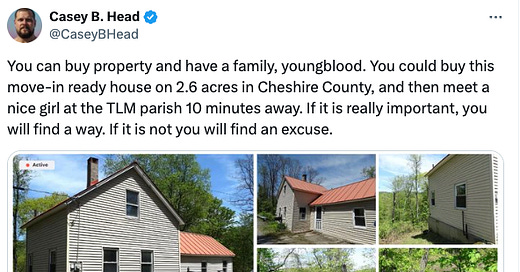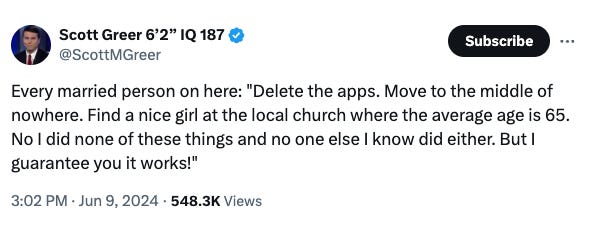A recent tweet by Casey B. Head set off a series of discussions on right-wing Twitter:
The responses were predictably funny:
Perhaps in response to this conversation, VB Knives threw his hat into the ring:
This all is going to sound harsh, so I want to emphasize that I follow VB Knives and I often like his tweets. He's a rural guy who has real insight into rural America, seeing it for what it is, with its obesity and potheads and single mothers. But other times he seems to demonstrate a rural inferiority complex fueled by a resentment of urbanites, educated people, secular people, you know, the group with actual power and influence in society.
The rural nationalists can't agree on whether suburbanites are laptop-class layabouts or work-round-the-clock serfs to the Man. I pointed out that people in rural areas also fear losing their job, with the added complication that one company might employ half the town. People can trade insults and witty takes on Twitter all day, what should actually settle this argument is data on internal migration. Overwhelmingly, the flow from rural to urban/suburban areas.
As to the other point, that suburbanites have less political power, there's some truth to this. The Senate and Electoral College really are biased toward rural states. But who really has more political power, a South Dakota farmer or the Manhattan-domiciled publisher of the New York Times? Who's more likely to get a phone call with an Iowa Senator, an Iowa farmer or the out-of-state President of an agribusiness firm that employs 4,000 Iowans? You can exercise political power with your vote. You can also do so as a campaign donor, prosecutor, judge, lobbyist, regulator, and filer of lawsuits.
I asked VB why, if rural folk had such disproportionate power, they've consistently lost on so many issues over the last fifty years. He replied that there are more suburbanites. Maybe. But an example is instructive. Gay marriage was opposed more by rural folk than by those in cities. But the urbanite state courts and then the Supreme Court overrode the preferences of the majority. Meanwhile, media content from Hollywood and New York was being beamed by satellite into the homes of rural farmers in Kansas and Nebraska, eventually gaining majority support for what initially had to be forced through the courts. Rural areas have virtually no cultural influence on Hollywood and New York. Sometime in the 2010s, I was walking through a college campus and happened upon a preacher with a Southern accent who was preaching his fire and brimstone message to passersby, who mostly just laughed at him.
But what of the argument that the average Iowa farmer has a greater probability of becoming a Senator than the average suburban wagie? Even this is unclear. Here are the backgrounds of current Senators in the rural great plains/mountain Western states:
Kevin Cramer, ND - career politician.
John Hoeven, ND - worked at his Dad's bank.
John Thune, SD - career politician.
Mike Rounds, SD - partner at an insurance and real estate firm.
Pete Ricketts, NB - worked for his Dad's company. (TD Ameritrade)
Deb Fischer, NB - cattle rancher.
Roger Marshall, KS - doctor.
Jerry Moran, KS - banker and lawyer.
Chuck Grassley, IA - farmer and factory worker.
Joni Ernst, IA - military officer.
Jon Tester, MT - farmer.
Steve Daines, MT - manager at Procter & Gamble.
John Barrasso, WY - doctor.
Cynthia Lummis, WY - career politician.
Mike Crapo, ID - lawyer.
Jim Risch, ID - lawyer.
While farmer -> Senator is something that happens, lawyer -> Senator is still a better bet. (There are more farmers than lawyers in America as a whole; this is almost certainly the case for those states.) Even better would be career politician -> Senator. There's certainly a political lesson in the overrepresentation of small states in the Senate. If you want to maximize your political power, a good plan would be to move to the capital of a small state and try to get a job on a Senator's or Governor's staff, then work your way up the political food chain. While life in Pierre, South Dakota (population 14,091) or Bismarck, North Dakota (population 133,626) would be more "rural" than life in LA or NYC, you'd still be an office wagie, not a self-sufficient Jeffersonian farmer.
None of this is to say that living in a rural area is necessarily bad. The low cost of living means that you can live very well if you have one of the few high-paying local jobs, a high-paying remote job, or money saved up. If living close to nature is your thing, it's quite achievable, and you'll have most of the conveniences of modernity available at the local Wal-Mart. What you shouldn't do is tell yourself that your trad life on the farm is some ticket to political power. That's just copium.








There are a lot of cultural distortions deriving from the surreality (or parallel reality, 'alt'-reality) of social-media. It seems you are describing another one, and appropriately enough you cite some 'viral' social-media posts that engage in it.
The general phenomenon of the Internet distorting realities (especially that which is called social-media), is well-known by now. Why does it persist? Because people don't see specific cases when they appear before them. They know the general phenomenon, but when something pops up they think, "Oh, this one specific thing is still real."